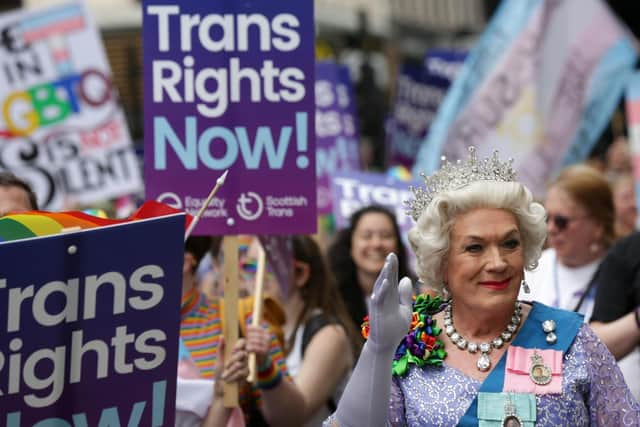Controversial gender reform legislation published by Scottish Government
and live on Freeview channel 276
Ministers said the long-awaited Gender Recognition Reform (Scotland) Bill is about “simplifying and improving the process for a trans person to gain legal recognition”.
It will require applicants to make a legally binding declaration that they intend to live permanently in their acquired gender.
Advertisement
Hide AdAdvertisement
Hide AdThey will no longer need to provide medical reports or evidence, and the process will be substantially quicker.


The Bill will also lower the age at which trans people can obtain the relevant document from 18 to 16.
Supporters say the move will streamline a process many find distressing, but critics have raised concerns self-identification will undermine women’s sex-based rights, such as access to women-only spaces.
Senior SNP politicians, including Finance Secretary Kate Forbes, signed an open letter in 2019 raising concerns about "conflating sex with gender identification”.
Advertisement
Hide AdAdvertisement
Hide AdIt said: "Changing the definition of male and female is a matter of profound significance. It is not something we should rush."
Earlier this week, Ms Forbes refused to say if she would support the Bill amid speculation some SNP MSPs want a free vote on the reforms to avoid repercussions if they go against the party whip.
A ministerial statement on the Bill is expected in Holyrood this afternoon. This is an unusual move and is seen as an acknowledgement of the wider, heated debate.
The Bill will amend the Gender Recognition Act 2004 to introduce new criteria for applicants who wish to obtain a Gender Recognition Certificate (GRC).
Advertisement
Hide AdAdvertisement
Hide AdObtaining a GRC means a trans person is legally recognised in their acquired gender and can obtain a new birth certificate showing that gender.
Applicants will be required to live in their acquired gender for a minimum of three months, reduced from two years, with a reflection period of a further three months before a certificate is granted.
The Bill proposes a criminal offence for applicants to make a false statutory declaration, with a potential punishment of up to two years’ imprisonment.
Information held by National Records of Scotland shows around 30 people a year from Scotland obtain full GRCs.
Advertisement
Hide AdAdvertisement
Hide AdThe Scottish Government estimated this will rise to between 250 and 300 applications a year following the new legislation, with an annual running cost of £150,000.
Documents published alongside the Bill say the most common reasons that trans women in Scotland gave for having not applied for a GRC were the process being too bureaucratic (48 per cent), not meeting the requirements (35 per cent) and the cost of the application (33 per cent).
A further 10 per cent said they didn’t have the time, 11 per cent said they didn’t want to share their medical information, and 5 per cent said that it was difficult to access their medical records.
For trans men, not meeting the requirements was the most common reason for not applying (51 per cent), followed by the application cost (37 per cent) and the process being too bureaucratic (33 per cent).
Advertisement
Hide AdAdvertisement
Hide AdA further 12 per cent said that they didn’t have the time, 7 per cent said that they didn’t want to share their medical information, and 6 per cent said that it was difficult to access their medical records.
The Scottish Government said it had not identified any evidence supporting a link between women-only spaces being inclusive of transgender women, and non-trans men falsely claiming a trans identity to access these spaces and committing sexual violence.
Social Justice Secretary Shona Robison said: “Trans men and women are among the most stigmatised in our society and many find the current system for obtaining a Gender Recognition Certificate to be intrusive, medicalised and bureaucratic.
“This Bill does not introduce any new rights for trans people. It is about simplifying and improving the process for a trans person to gain legal recognition, which has been a right for 18 years.
Advertisement
Hide AdAdvertisement
Hide Ad“Our support for trans rights does not conflict with our continued strong commitment to uphold the rights and protections that women and girls currently have under the 2010 Equality Act. This Bill makes no changes to that Act.
“The Scottish Government has always been keen to seek consensus where possible and to work to support respectful debate. That will remain a guiding principle as the Bill progresses through Parliament.”
Scottish Greens equalities spokeswoman Maggie Chapman said the Bill is “long overdue”.
She said: “The current system of gender recognition is lengthy, often expensive, and causes unnecessary distress, trauma and anxiety. It is damaging to trans people’s mental health and also puts their lives in danger.
Advertisement
Hide AdAdvertisement
Hide Ad“There has been a lot of misinformation surrounding the simple proposals outlined today, which will allow trans people to change their birth certificate to recognise them as who they are, including when they marry, pay their taxes or get their pension.”
Scottish Trans Alliance manager Vic Valentine said: “We welcome the proposals in this Bill, that would see a massive improvement in how trans men and trans women in Scotland are able to be legally recognised as who they are.
“The current process is difficult, stressful and expensive, and it reinforces harmful stereotypes about trans people, that who we are is a mental illness, and that our choices about our bodies are not our own to choose to share with others.
“While the proposals fall far short of a law that would enable all trans people in Scotland to be legally recognised as who we are, this important step forward is one that we hope that all MSPs across the chamber can support.”
Comment Guidelines
National World encourages reader discussion on our stories. User feedback, insights and back-and-forth exchanges add a rich layer of context to reporting. Please review our Community Guidelines before commenting.
